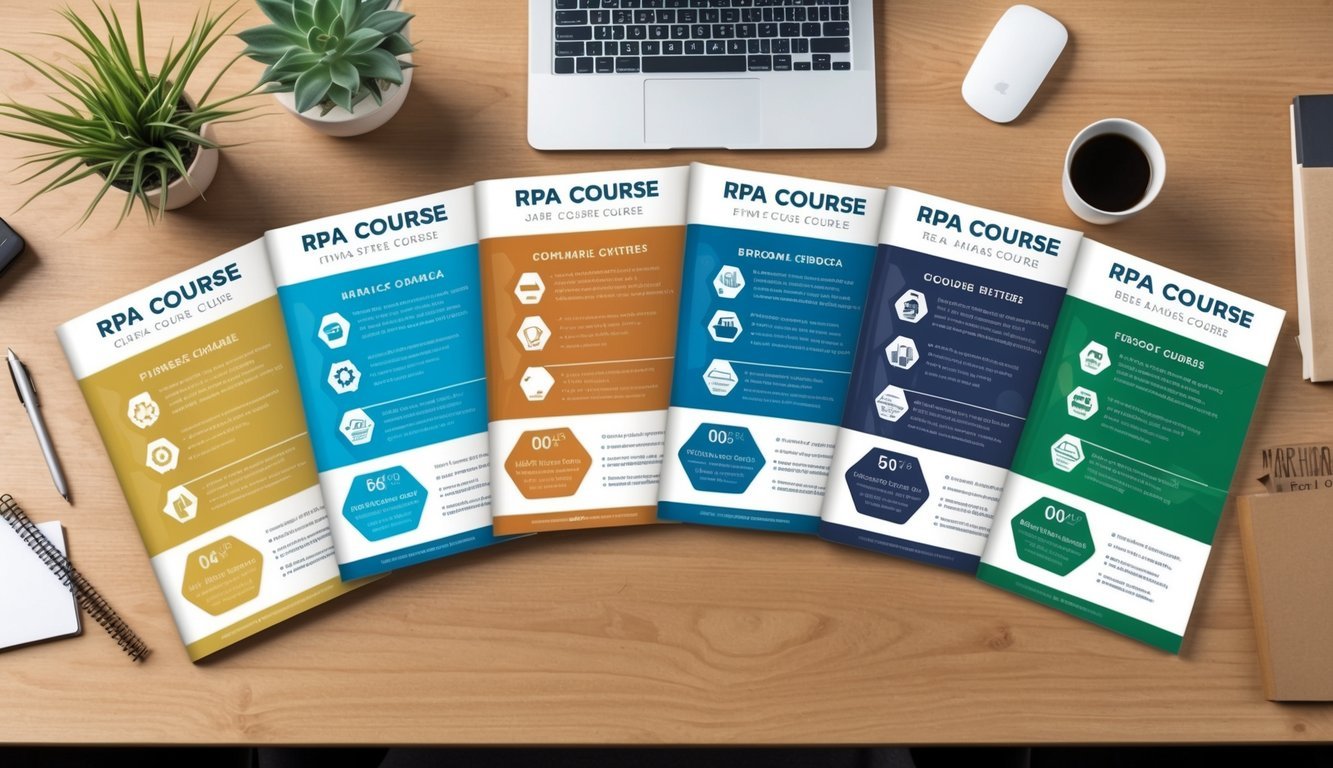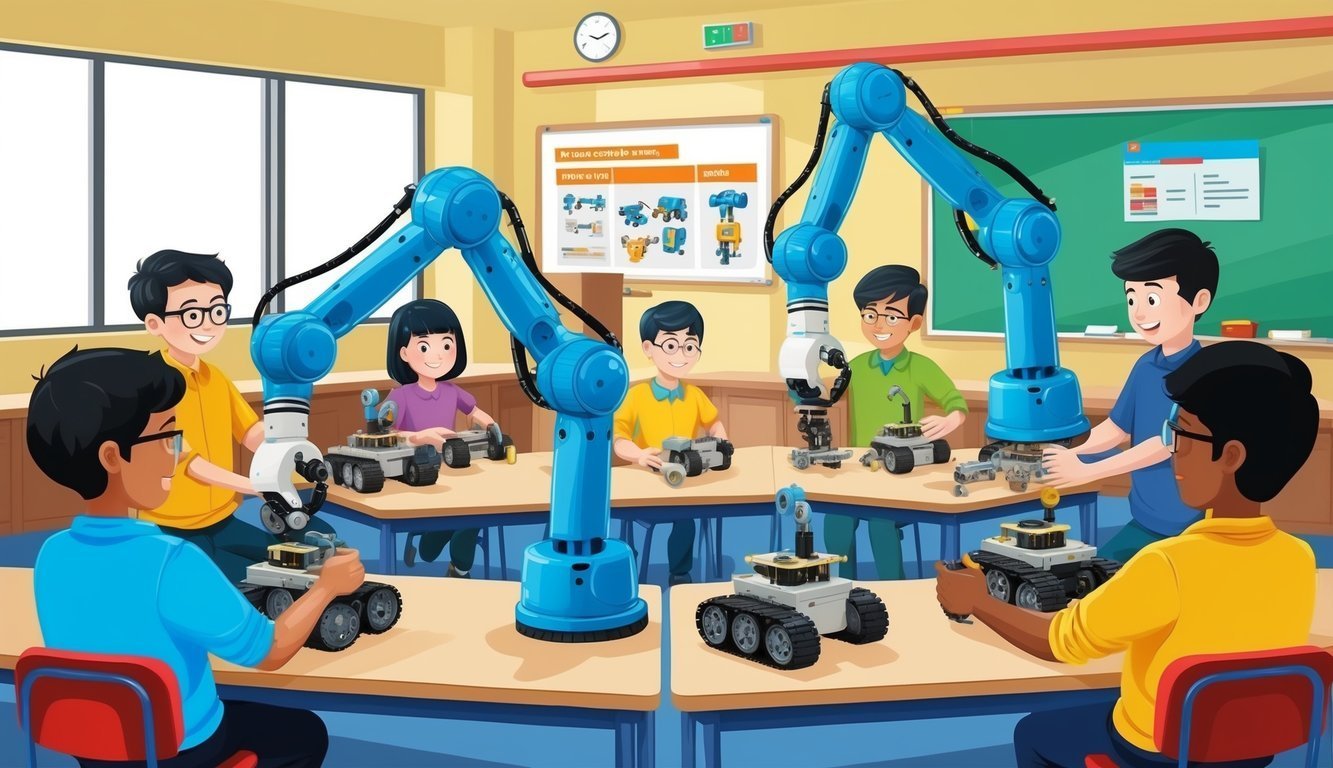“`xml
Robotic Process Automation (RPA) is shaking things up in the business world.
It’s like giving companies a turbo boost—allowing them to complete tasks faster and with way fewer mistakes.
With a growing demand for RPA skills across various job markets, diving into this field could be your ticket to career advancement!

If you’re eager to dive in, check out this list of RPA courses online to kick things off. They’ll teach you how to work with RPA tools and design automated workflows.
These courses cater to both newbies and veterans looking to sharpen their skills.
Let’s take a look at five top-notch RPA courses you might want to consider.
1) UiPath RPA Developer Course
Thinking about kicking off your journey in robotic process automation? The UiPath RPA Developer Course might just be the gem you’re looking for.
This program is packed with everything you need to become a proficient RPA developer.
You’ll start with the basics and quickly breeze through building your very own software robots from scratch.
It’s designed to give you hands-on experience, ensuring you’re developing actual automation solutions in no time.
What’s really awesome about this course is that it’s beginner-friendly.
No prior experience with UiPath or RPA? No sweat! The instructors break down complex ideas into bite-sized pieces that are easy to digest.
By the end, you’ll have created seven different robots.
Yep, you’ll have a portfolio to show off to future employers! These hands-on projects will help reinforce your grasp on crucial robotics concepts, giving you the confidence to take on real-world challenges.
Plus, you’ll snag experience that complements other technical skills, like those from the best cloud computing courses.
Showcasing your completed robots is an excellent way to prove you can effectively sync hardware and software solutions.
This course also gears you up for UiPath certification exams, which can definitely set you apart in the competitive RPA job market.
And let’s not forget, UiPath is a major player in the RPA arena.
Learning to use it can open up some exciting career doors!
2) Automation Anywhere Advanced RPA
Ready to elevate your RPA skills? Check out the Automation Anywhere Certified Advanced RPA Professional Prep course.
It’s perfect for those who are already into RPA and want to take their expertise to the next level.
This course gets you prepped for the Advanced RPA Professional certification exam, diving into complex automation scenarios you’ll need to tackle.
You’ll cover all the essential features of Automation 360, including the Universal Recorder.
It’s your guide to building bots that can automate those tricky processes with ease.
But don’t fret if you’re new to RPA; Automation Anywhere has beginner-friendly courses too! They start with the fundamentals to ease you into the world of RPA.
As you progress, you’ll work through real business cases.
This hands-on approach helps you apply what you’ve learned to actual workplace situations, ensuring you’re job-ready.
By the end of the course, you’ll feel confident and prepared for that certification exam.
Plus, you’ll walk away with skills that are highly sought after in today’s job market.
3) Blue Prism Certification Training
Want to sharpen your RPA skills? Blue Prism certification could be the right move for you.
This program offers a variety of courses to match different skill levels and career aspirations.
Blue Prism University is where you’ll find options tailored to your needs, whether you’re just starting out or advancing your skills.
If you’re dipping your toes in, the Generative AI with Blue Prism Intelligent Automation course is a great starter—a quick, 30-minute introduction to get you on your way.
For something a little more substantial, check out the Associate Developer certification.
It’ll test your abilities to create basic Blue Prism automation solutions.
If you’re ready to tackle more complex topics, then look into the Professional Developer certification.
This is for those eager to design advanced automation processes.
You can choose to take these courses online or in a classroom setting.
Some sessions are even led by authorized trainers to ensure top-notch learning.
4) Microsoft Power Automate Training

Interested in using Microsoft tools for robotic process automation? Power Automate is a stellar option for creating workflows and automating tasks across various apps.
Start with the Power Automate overview course.
This free online training will introduce you to the basics, teaching you how to create simple workflows and automate routine tasks.
If you want hands-on practice, take a look at the Automation in a Day workshop.
This course lets you play around with Power Automate in real-world situations.
It’s designed for instructor-led settings, but you can also tackle it solo.
If your focus is desktop automation, try out the Automate processes with RPA and Power Automate course.
You’ll learn how to use Power Automate to handle tasks like managing Excel files.
For a deeper dive into RPA with Power Automate, check out the RPA with Microsoft Power Automate: Getting Started course on Pluralsight.
It covers the essentials of RPA while guiding you through creating RPA workflows.
5) Nintex RPA Platform Workshop

Eager to learn more about robotic process automation? The Nintex RPA Platform Workshop could be what you need.
This 90-minute session is all about boosting your automation skills.
You’ll assess your current automation efforts using Nintex’s Process Maturity model—an insightful way to see where you stand and where you can level up.
Plus, the workshop encourages you to find innovative ways to incorporate automation into your work.
You’ll dive into exciting new ideas that can enhance your processes.
What’s more? You’ll get insights and answers from experts in process automation.
It’s a real chance to learn from the pros and elevate your automation game.
Understanding Robotic Process Automation (RPA)

RPA is a game-changer that can seriously save you both time and money.
It uses software robots to tackle repetitive tasks quickly and accurately.
What is RPA?
Think of RPA like having digital assistants that handle mundane tasks for you.
These software bots can click buttons, input data, and switch info between apps just like you would.
They’re perfect for tasks that follow strict rules.
Imagine data entry, form filling, or transferring information from one system to another—RPA bots can work around the clock without getting tired or making those pesky mistakes.
You don’t have to be a tech guru to jump in either.
Many tools allow you to set up bots by simply showing them what to do—kind of like teaching a new employee, just a lot quicker!
Benefits of RPA
RPA can truly enhance your business operations.
Here’s how:
- Save time: Bots outpace humans on repetitive tasks, no contest.
- Cut costs: You can achieve more with fewer people.
- Fewer errors: Bots don’t get distracted, leading to fewer slip-ups.
- Happier employees: Your team can focus on meaningful work instead of monotonous data entry.
RPA can be beneficial in many sectors—think finance, HR, customer service, and more.
Bots can easily handle tasks like processing invoices, onboarding new hires, or managing simple customer queries.
Want to learn even more? Take a look at Robotic Process Automation Specialization on Coursera.
It’ll guide you in designing and implementing your own RPA solutions!
Criteria for Choosing RPA Courses

Choosing the right RPA course is key to a successful learning experience.
Here’s what to keep in mind:
Course Content and Structure
Look for courses that cover both the basics and more advanced RPA topics.
A solid course should introduce you to different RPA tools and their applications.
Hands-on projects? Yes, please! They’re a great way to practice what you learn.
Does the course offer certifications? These can really up your resume game.
And let’s make sure the course fits into your schedule.
Some options are self-paced, while others stick to a fixed timeline.
Instructor Expertise
The instructor’s background can significantly influence your learning.
Look for teachers with real-world RPA experience.
What’s their background in the field? Have they worked on RPA projects?
It’s also a bonus if the instructor stays current with the latest RPA trends.
Things change rapidly, and staying on top of it matters!
Courses led by industry experts can offer practical insights that you won’t find in textbooks.
And hey, reading student reviews can give you a sense of their teaching style.
Are they clear and engaging?
Frequently Asked Questions

RPA courses come in a variety of flavors.
Some are free, while others might require payment.
And don’t forget—certifications can seriously boost your career prospects!
What are the top online courses for robotic process automation?
The UiPath RPA Developer Course often tops the list.
It covers everything from the fundamentals to advanced levels.
Automation Anywhere Advanced RPA is fantastic for diving deep into complex automation.
Blue Prism Certification Training is the go-to for enterprise-level RPA training.
How do I start learning robotic process automation as a beginner?
Start with the basics.
A beginner-friendly course like the UiPath RPA Developer Course is a solid choice.
Check out YouTube for tutorials—they can offer a fun way to get the hang of RPA concepts.
And don’t overlook free trials of RPA software.
Getting hands-on experience is invaluable.
Are there any free RPA courses available?
Coursera has RPA courses you can audit for free.
You only pay if you want a certificate.
Plus, UiPath provides free training through their academy—a fantastic entry point.
Which certification for RPA is most recognized by employers?
UiPath certifications are highly regarded in the field and often considered the gold standard.
Automation Anywhere and Blue Prism certifications also carry a lot of weight.
Choosing the best one for you depends on the RPA software your target employers use.
What’s the process for becoming RPA certified?
First, select a certification program.
Popular options include UiPath, Automation Anywhere, and Blue Prism.
Next, complete the necessary training that usually involves online courses and practical experience.
Finally, gear up to pass the certification exam, which will test both theoretical knowledge and practical skills.
Which RPA software should I learn to stay ahead in the market?
UiPath is a top contender here.
It’s widely adopted and has a robust community.
Automation Anywhere is another excellent choice, known for its user-friendly interface.
Microsoft Power Automate is gaining traction as well, particularly since it integrates seamlessly with other Microsoft products.
Thinking of learning multiple platforms? A versatile skill set can make you even more attractive to employers!
“`

